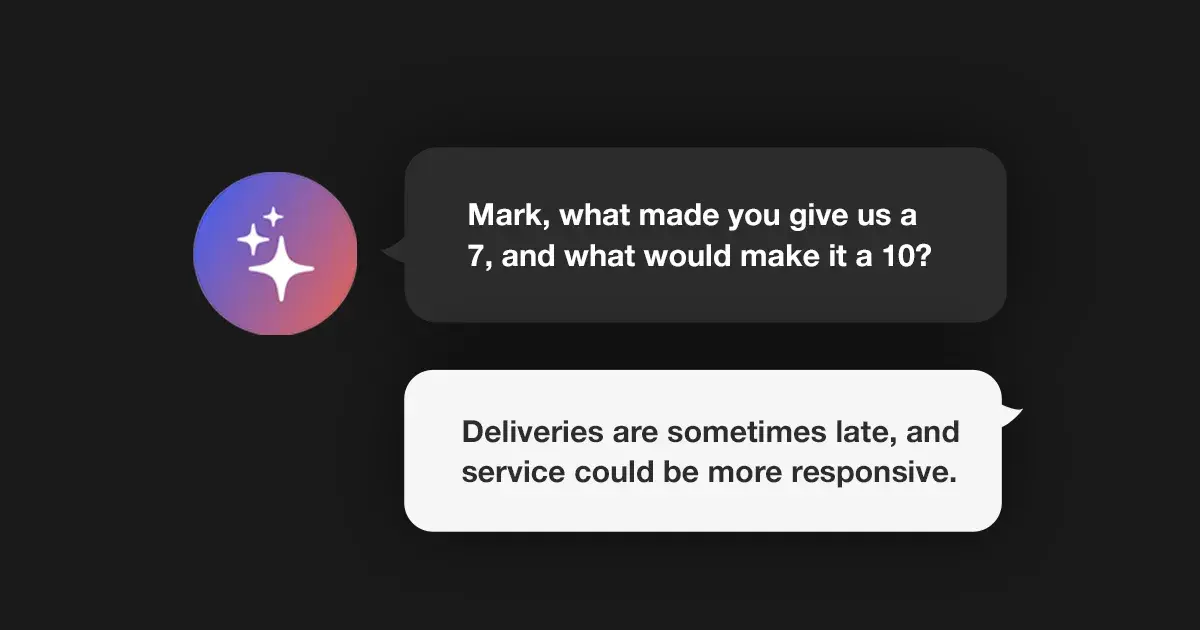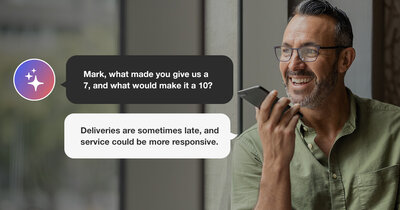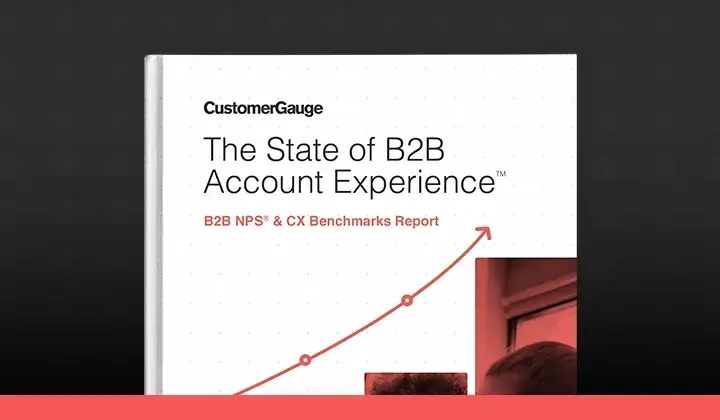Are you in the market for SurveyMonkey alternatives? Curious to find out if there are other platforms you should be considering to better understand your customers, improve your CX, or reduce customer churn?
The good news is: there are several and each offers something slightly different.
That’s good if you are looking for analytics a little more robust than those that SurveyMonkey offers or if you’re after survey functionality that can feed into a fairly complex CX management program.
Customers have noted that SurveyMonkey doesn’t scale very well, so if you’re a big business or enterprise, you might find that it doesn’t quite suit your needs.
That’s why we’ve put together a list of top alternatives to SurveyMonkey. Here you’ll find a variety of solutions that can work for different business sizes and markets.
Let’s dive in.
5 SurveyMonkey Alternatives for B2B Companies
1. CustomerGauge
CustomerGauge was recently ranked the best CXM tool for B2B companies according to Gartner’s 2020 Critical Capabilities report, making it a worthy SurveyMonkey alternative.
Using its proprietary Account Experience methodology, CustomerGauge focuses exclusively on B2B organizations with complex account structures and multiple stakeholders. It assesses and engages with these primarily through Net Promoter Score (NPS) surveys.
It’s important to note, however, that while CustomerGauge boasts exceptional survey functionality and has established itself as a leader in voice of customer (VoC) and relationship and transactional surveys, it is much more than a survey tool.
It provides a clear overview of your accounts, including those that are healthy, those at risk of churn, and those open to upselling and cross-selling opportunities.
And perhaps most importantly of all, it ties your CX survey data to your revenue.
This key differentiating factor helps to secure C-Suite buy-in and identify the opportunities and risks that affect your bottom line to help you intervene quickly and effectively.
CustomerGauge users praise the platform’s strong case management capabilities, in-depth reporting functionality, and the invaluable support they receive from the CustomerGauge team.
Want to find out more? Request a demo here.
Pricing: Contact our sales team for details.
G2 score: 4.6/5
How does CustomerGauge compare to SurveyMonkey?
While SurveyMonkey is primarily a survey tool, CustomerGauge is designed for customer experience management, customer revenue optimization, and customer advocacy. That means it’s not just about asking customers and prospects how they feel, but doing something about it, too.
Further, SurveyMonkey tends to focus on small businesses while CustomerGauge is more established in the mid-market to enterprise segments. Most importantly, the platform tends to focus on B2B brands.
CustomerGauge excels in the quality of its support, being a strong partner to its customers, and overall product direction.
2. SurveySparrow
SurveySparrow is an end-to-end omnichannel platform that provides insight into customer, employee, product, marketing, and sales experiences.
The strength of its CX solution lies in the versatility of its surveying capabilities.
SurveySparrow lets you customize chatbots that can be embedded on your website, providing a simple and engaging way to collect feedback from customers. Its ability to create offline surveys is another useful feature.
SurveySparrow is mostly used among information technology and services companies and by those operating in the marketing and advertising space. Its users particularly enjoy its ease of use, including how easy it is to set up and the quality of support.
Pricing: SurveySparrow has a tiered pricing model that suits a range of budgets. At the enterprise level, customers can expect to pay $499 per month. It’s worth noting that each package covers only a certain number of survey responses per month — after that, you pay per response.
G2 score: 4.4/5
How does SurveySparrow compare to SurveyMonkey?
Although these two platforms might be slightly different creatures, they are both survey-focused products that cater primarily to small businesses.
Feedback provided by users on software platform G2 ranks SurveyMonkey higher than SurveySparrow in terms of its survey management capabilities but says that SurveySparrow is more customizable.
Reviewers appreciate the attractive and intelligent design of SurveySparrow’s surveys and the ability to reach customers across multiple platforms. Some found it difficult to navigate all the different features of the tool, however.
3. Qualtrics
Qualtrics is a large and established customer and employee experience provider that focuses on large enterprises.
Its customer experience and employee management platforms, Customer XM and Employee XM, help users to improve the experience of both groups. Their brand, product, design, and core products go on to address other key business priorities.
One positive review says,
“Partnering with Qualtrics has provided us with the right tools to define, measure, and prioritize different member experience journeys throughout our credit union. Since we started utilizing the tools available with Qualtrics, we have been able to make impactful organizational changes based on the feedback received from our members.”
While it boasts strong relationships with 13,500 enterprises worldwide, Qualtrics is on the pricey side. Its other offerings, including its statistics and reporting, have also been accused of being clunky and not in line with best practices. Plus, its support team doesn’t receive a lot of praise from users, having been mentioned for doing the bare minimum.
Pricing: Qualtrics Customer CX has a free version, but its paid version starts at $1,500 per year.
G2 score: 4.3/5 (Qualtrics Customer CX)
How does Qualtrics compare to SurveyMonkey?
Qualtrics is much more focused on large enterprises than SurveyMonkey, so if you’re in the larger business segment, it might be a better option for you.
In terms of both questionnaire design and reporting capabilities, Qualtrics also has a more advanced set of features than SurveyMonkey and it’s highly regarded for both its survey management and customization.
It is expensive though, so the Qualtrics alternative SurveyMonkey might be better suited for smaller businesses that are more cost-conscious.
4. Medallia
Medallia is all about making it easy for large companies to capture and make sense of customer data through strong analysis and prediction systems. It uses AI and machine learning engines to examine incoming data and integrate it with other business applications.
Medallia’s VoC software comprises different layers, allowing you to view a particular customer’s journey in purchasing a product or service. It also lets you group customers depending on certain behaviors such as whether they made use of a coupon or discount.
While Medallia boasts advanced technical capabilities, these, like the Qualtrics alternative, come at a cost, and you might find Medallia more expensive than other tools.
Pricing: The cost of Medallia depends on the features you need and the size of your business. Medallia does also issue prepackaged options that smaller organizations might find useful.
G2 score: 4.4/5 (Medallia Customer Experience)
How does Medallia compare to SurveyMonkey?
Reviewers typically find the Medallia alternative SurveyMonkey easier to integrate and deploy than Medallia, but that might be because Medallia’s features are more comprehensive and perhaps initially more complex than SurveyMonkey’s.
Medallia features built-in controls, skip logic (which automatically skips irrelevant questions), and extensive data analysis abilities. Some users have reported issues, however, with one claiming that
“Medallia creates as [many] problems as it does solutions when it comes to deploying new programs and scaling feedback methodologies.”
SurveyMonkey would be a simpler, cheaper alternative, but might not offer everything you need if you’re a large business.
5. Typeform
Typeform pitches itself as the gold standard of no-code, user-friendly forms, quizzes, surveys, and asynchronous video solutions. Its approach is to make the process feel more like a conversation than a clinical survey process.
Typeform’s distinctive interface has become its trademark and you can use a simple drag-and-drop functionality to include questions, images, and video. Typeform also features over 120 existing integrations that ensure the data gathered seamlessly plugs into workflows.
Fans of Typeform believe it is…
“A much better alternative than most survey-creation platforms, owing to its expansive capabilities and user-friendliness. It offers a variety of features as compared to its competitors. It also offers a variety of designs to create more interactive and aesthetic forms making the process of surveying more interesting and engaging.”
Pricing: Typeform’s tiered pricing solution caters to a variety of needs. At the business level, you can expect to pay $99 per month for 10,000 responses a month. Enterprises, you’ll need to contact Typeform directly for a personalized quote.
G2 score: 4.5/5
How does Typeform compare to SurveyMonkey?
Typeform also largely caters to small businesses, which makes it a viable alternative to SurveyMonkey. It ranks well in terms of its templates, survey distribution, and branding, but loses out to SurveyMonkey in terms of question types, multimedia support, and multilingual surveys.
The platform deserves its reputation for elegant surveys, but if you’re looking for something that has fairly advanced features you might want to go with one of the more comprehensive options suggested above.
CustomerGauge: A SurveyMonkey Alternative That Puts B2B First
CustomerGauge is the survey and CX management tool of choice for B2B companies.
Use it to survey your customers at every step during their user journey as a means of identifying and addressing their pain points, reducing churn, and making the most of upselling and cross-selling opportunities.
Want to find out more? Contact CustomerGauge today!




